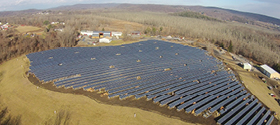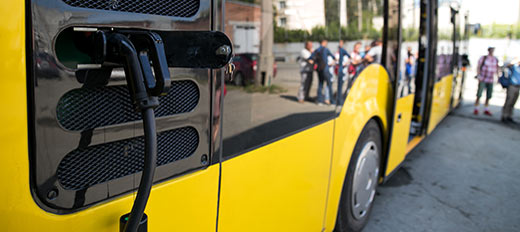Fostering Healthy and Resilient Communities
Partnering With Communities to Decarbonize for a Cleaner, Safer Future
More than 200,000 buildings would need to be decarbonized annually for the next 30 years to address New York’s entire building stock by 2050.
Collaboration between the State and local level is critical to achieving our climate goals and expanding clean energy generation across New York. Moving our economy away from fossil fuel energy sources (e.g., natural gas) – a process known as decarbonization – creates healthier living environments while reducing greenhouse gas emissions to combat climate change. This transformation spans buildings and infrastructure, transportation, power generation, and industry, and for it to succeed, we need to provide communities with the tools and resources to obtain local benefits from clean energy while working towards a decarbonized future.
New York’s diverse communities, spanning 932 towns, 62 cities, and 10 Indigenous Nations, have shared interests in preserving and expanding quality of life, including affordable housing, job opportunities, and clean air and water. Yet, the greatest environmental burdens from the fossil fuel economy have been borne by Disadvantaged Communities, as demonstrated by disparities in air quality and vulnerability to the impacts of climate change.
Accelerating our decarbonization efforts, especially in historically marginalized communities, can reverse these health inequities and ensure all New Yorkers benefit from the clean energy transition.
How We’re Advancing Public Health and Climate Resilience
Health and safety benefits from clean energy and decarbonization can be difficult to quantify and may not always be well understood. NYSERDA is strengthening local capacity and awareness through planning resources, community engagement, and developing holistic community-scale solutions to decarbonize buildings, transportation, and power generation.
Specifically, NYSERDA’s key strategies include:
- Siting and building distributed clean energy projects that deliver community benefits by providing guidance on project economics, taxes, siting assistance to local governments, and ensuring projects deliver tangible benefits to residents of host communities.
- Growing local partnerships and driving investment in clean energy on brownfields or otherwise underutilized land, offering support including through grants under the Just Transition Site Reuse Planning Program.
- Implementing programs that provide technical and financial assistance, build local capacity, and facilitate local engagement to support community-scale decarbonization through the Clean Energy Communities Program and the Clean Energy Hubs.
- Partnering with municipalities, communities, and individual landowners to promote neighbor-to-neighbor clean energy campaigns and testimonials, sharing best practices by local government champions for clean energy.
- Partnering with stakeholders and Community-Based Organizations (CBOs) within Disadvantaged Communities to co-develop local clean energy agendas and deploy community-scale distributed energy resources including solar, storage, green hydrogen, and district geothermal systems.
- Deploying novel clean transportation and zero-emission vehicle/mobility solutions with prize funding supporting clean vehicles, personal mobility, and medium- and heavy-duty transportation transformations that benefit environmental justice communities.
- Helping communities address indoor air quality challenges, providing building science expertise and creating greener and healthier schools.
- Developing and implementing the Extreme Heat Action Plan in partnership with the Department of Environmental Conservation and Department of Health, and dozens of other State Agencies as well as municipal and community stakeholders to address the threat of extreme heat in Disadvantaged Communities, workplaces, and recreational areas across the State. The Action Plan will provide recommendation to mitigate neighborhood climate impacts associated with extreme heat.
- Incorporating strategies to optimize resilience in an electrified future as homes are decarbonized, such as preparing homes for backup systems according to the occupants’ needs and the heating and cooling systems’ replacement cycle.
- Providing communities with planning services to inform future decision making at the local level to help mitigate negative impacts of pending or future fossil fuel power plant closures.
- Supporting municipal utilities and rural electric cooperatives to undertake climate vulnerability assessments and undertake measures that strengthen the resilience of the electric grid.
- Increasing energy efficiency and renewable energy generation at State-owned buildings and public schools.
Achieving Community Decarbonization
Empowered with resources and State support, local governments will advance clean energy development that provides host community benefits and prioritizes underutilized spaces, such as brownfields and former industrial sites.
By 2050, 85% of New York buildings will use clean heating and cooling technologies, such as heat pumps and thermal energy networks.
Most New York homes and buildings will undergo energy efficiency improvements and adopt heat pumps or connect to thermal energy networks, eliminating the combustion of fossil fuels and fostering safer indoor environments. As more vehicles and power plants eliminate the use of fossil fuels and shift to clean energy, New York communities will see improved air quality, lessening the risk of asthma, respiratory illness, heart disease, and other adverse health impacts.
Achieving community decarbonization will promote job growth and investment across New York, further enhancing the health and economic well-being of New Yorkers.
Key Programs and Initiatives
-

Clean Energy Communities
Read More Clean Energy CommunitiesProvides support, recognition, and grant funding for municipalities that take action to reduce emissions and advance clean energy in their communities.
-

P-12 Schools Initiative
Read More P-12 Schools InitiativeResources and information on programs to help pre-k through grade 12 schools invest in energy efficiency and clean energy upgrades.
-

Just Transition Site Reuse Planning
Read More Just Transition Site Reuse PlanningProvides communities with planning services to inform future local decision-making to help mitigate any negative impacts of pending or future fossil fuel power plant closures.
-

Regional Clean Energy Hubs
Read More Regional Clean Energy HubsTeams of trusted, knowledgeable, community-based organizations across the State helping New Yorkers navigate clean energy opportunities for their home, business, or career.
-

Clean Transportation Prizes Initiative
Read More Clean Transportation Prizes InitiativeShowcases innovative clean transportation solutions in underserved communities across New York State.
-

NY Energy Advisor
Read More NY Energy Advisor (opens in new window)A one-stop shop site to help low- to moderate-income New Yorkers get access to personalized energy savings programs.
Sign Up For News
Stay up to date on energy-saving programs and incentives, best practices, and more.
Stay Connected